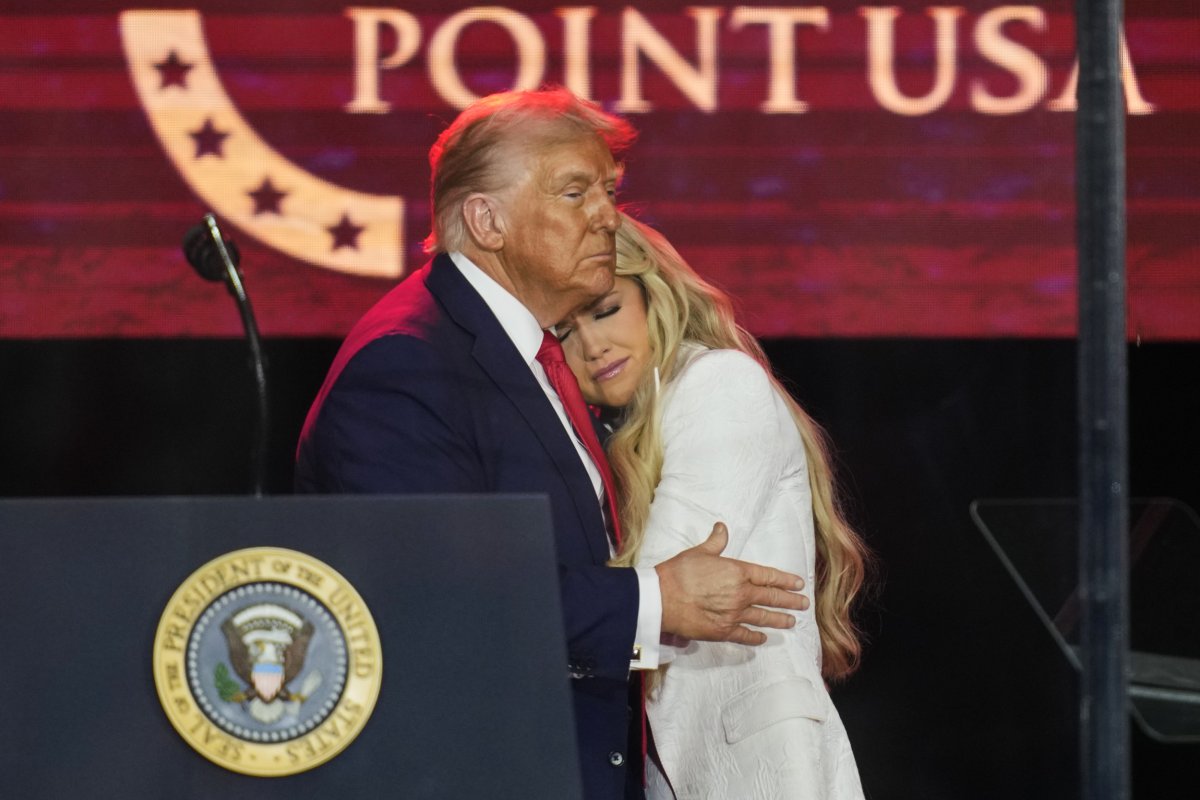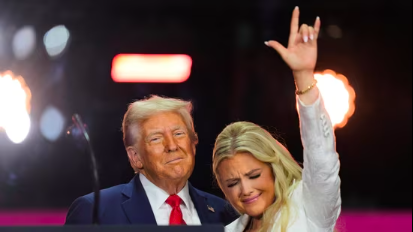The world watched in solemn silence. Tens of thousands of people, their faces etched with grief, had gathered inside State Farm Stadium, a colossal arena typically reserved for the thunderous roars of football fans. But on this day, the air was heavy with something far more profound than athletic anticipation. It was a palpable mix of sorrow, defiance, and a quiet, unshakeable faith. The memorial service for Charlie Kirk, a young man who had become a towering figure in American politics, was underway.
His shocking assassination on September 10th had sent shockwaves across the nation, sparking a renewed and often bitter debate about the state of political discourse. Yet amid the powerful speeches from family, friends, and political allies, one simple but deeply powerful gesture by his widow, Erika Kirk, captured the hearts of millions and became the defining image of the service. It was a moment of intimate, raw grief on a world stage, a silent message that cut through all the noise.

A Gesture That Spoke Louder Than Words
As she stood before the immense crowd, her voice, though filled with a sorrow so deep it seemed to shake the very foundations of the stadium, was resolute. She delivered an emotional tribute to her husband, a man she described as living a life without regret. Yet it was not her spoken words that would resonate most powerfully. It was the moment she raised her left hand, fingers poised in a deliberate formation, and pointed it toward the sky.
To the casual observer, it may have seemed like a simple salute or a wave to the heavens. But those with a discerning eye—and those familiar with American Sign Language—knew instantly what they were seeing. The gesture was the ASL sign for “I love you.” Formed by extending the thumb, index finger, and little finger while keeping the middle and ring fingers pressed against the palm, the sign is a beautiful and universal symbol. It combines the letters I, L, and Y from the ASL alphabet, a wordless promise of eternal love.

By raising her hand heavenward, Erika was not just making a symbolic gesture for the tens of thousands in the audience. She was sending a message of eternal love to her late husband, a silent and sacred communication from her heart to his spirit. This intimate, wordless message, set against the backdrop of a stadium full of mourners, summed up the love and loss felt that day more powerfully than any speech possibly could have. Photos and videos of the gesture circulated across social media at a viral pace, as observers commented on the profound intimacy and raw beauty of her tribute.
The Unforgettable Context
What made the moment even more striking was the powerful context in which it took place. Erika stood just a few feet away from President Donald Trump, a man whose presence underscored the gravity of the event, elevating it from a personal family memorial to a moment of national significance. Trump had come to deliver his own eulogy for the fallen conservative leader, and his presence turned the stadium into a powerful stage for a message of remembrance and resolve.
In a political climate marked by division and vitriol, Erika’s gesture broke through the noise with a quiet, undeniable grace. It was not partisan, not strategic, not about ideology. It was simply an expression of enduring love and a testament to a faith that refused to be broken. By choosing the language of the deaf community, her tribute resonated universally, transcending barriers of speech and culture. Her message was pure, unfiltered, and deeply human—a raw reminder that behind the political figure was a man deeply loved as a husband and father.
A Message of Forgiveness and A Promise of Legacy
While her hand gesture drew the most attention, Erika’s spoken words were equally, if not more, moving. With her voice breaking at times, she described her husband as a man who lived without regret, who gave his all to every single day. “Charlie died with incomplete work,” she admitted, her voice filled with a profound sorrow, “but not with unfinished business.” It was a heartbreaking distinction that spoke volumes about her husband’s life and legacy.
Then, in an extraordinary display of grace and faith that stunned and humbled everyone in the stadium, Erika declared that she forgave her husband’s killer. Citing the words of Christ on the cross—”Father, forgive them, for they know not what they do”—she explained that forgiveness was not only central to her faith but also consistent with what her husband himself would have wanted. “My husband wanted to save young men, just like the one who took his life,” she said, referencing 22-year-old Tyler Robinson, who has been charged with the murder. Her message was not one of vengeance, but of redemption, turning a personal tragedy into a testimony of compassion and resilience that echoed far beyond the stadium walls.
Perhaps most significantly, Erika also announced her commitment to continue her husband’s mission. Charlie Kirk, through Turning Point USA, had built a movement aimed at empowering young Americans and influencing the national conversation on culture and politics. As a grieving widow, Erika was not content to simply mourn. She vowed to carry that vision forward, to take up the torch that had fallen from his hand. “The world needs a group that will point young people away from the path of misery and sin,” she said with powerful determination. “And so, I promise you today, every part of our work will become greater.”
Her words were not just a tribute but a declaration that Charlie’s legacy would not end with his death. In fact, she implied, it would grow stronger, with herself at the helm of TPUSA as its new chairwoman and CEO. Her promise was a public manifestation of a private resolve, a mother’s fierce dedication to ensure her children will one day know their father’s work lives on.

A Day of Symbolism and Faith
The memorial service was filled with symbolic moments, from the powerful eulogies to the announcement that Charlie Kirk would be posthumously awarded the Presidential Medal of Freedom, the highest civilian honor in the United States. President Donald Trump confirmed that he would personally ensure the recognition, a poignant gesture that affirmed Kirk’s place in American history.
Yet even in the midst of these momentous events, Erika’s silent gesture stood out above all else. By raising her hand in the ASL sign for “I love you,” she reminded the world that behind the political figure was a man deeply loved as a husband and father. Behind the headlines about violence and division was a family grieving a profound personal loss. And behind the anger and fear that often dominates national discourse was a message of love, faith, and forgiveness.
Charlie Kirk’s assassination has already become a defining moment in American political life, sparking debates and deepening divides. But at his memorial, his widow shifted the narrative—if only for a moment—toward something higher.
Her gesture was not about politics. It was not about power. It was about love that transcends death, forgiveness that defies hatred, and faith that refuses to break even under the weight of unimaginable loss.
As Erika Kirk stood beside Donald Trump, her hand raised to the sky, she offered a reminder that in the midst of chaos, the most enduring legacies are built not on division but on love. For the tens of thousands who filled the stadium, and the millions who watched online, it was a moment they will not forget—a moment that ensured Charlie Kirk’s memory lives on not just as a political figure, but as a husband, father, and man whose life inspired love until the very end.


